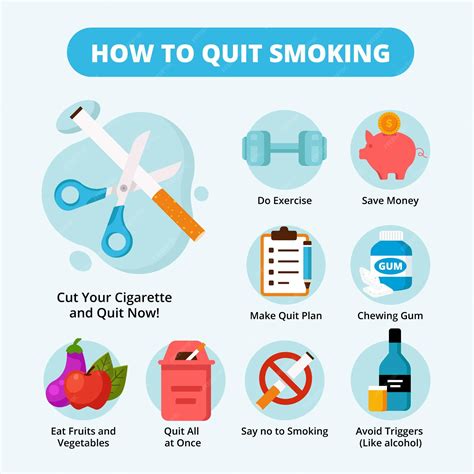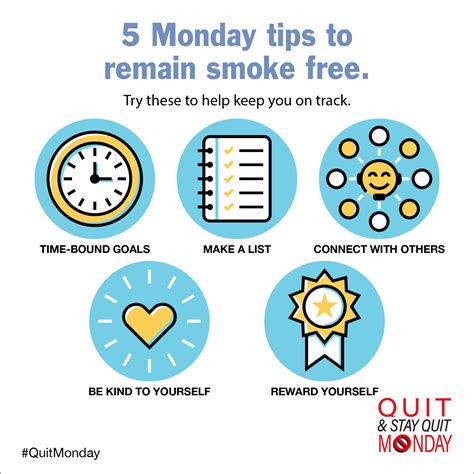Intro
Quitting smoking is one of the most challenging tasks a person can undertake, but it is also one of the most rewarding. Smoking is a harmful habit that can lead to a variety of serious health problems, including heart disease, stroke, and cancer. Despite the risks, many people struggle to quit smoking due to the addictive nature of nicotine. However, with the right mindset and strategies, it is possible to overcome the addiction and live a healthier, smoke-free life. In this article, we will explore the importance of quitting smoking and provide tips and advice on how to do so successfully.
The benefits of quitting smoking are numerous and well-documented. Within 20 minutes of quitting, heart rate and blood pressure decrease, and within 12 hours, carbon monoxide levels in the blood return to normal. After a few weeks, lung function improves, and the risk of heart attack begins to decrease. In the long term, quitting smoking can add years to a person's life and significantly reduce the risk of developing smoking-related illnesses. Furthermore, quitting smoking can also improve overall health and wellbeing, increasing energy levels and enhancing mental clarity.
For those who are struggling to quit smoking, it is essential to understand that it is a process that takes time, effort, and support. It is not something that can be achieved overnight, but with persistence and the right strategies, it is possible to overcome the addiction and live a smoke-free life. There are many resources available to help individuals quit smoking, including counseling, support groups, and nicotine replacement therapy. Additionally, there are many alternative methods, such as acupuncture and hypnosis, that have been shown to be effective in helping people quit smoking.
Understanding the Addiction

To quit smoking successfully, it is essential to understand the nature of the addiction. Nicotine is a highly addictive substance that can alter the brain's chemistry, leading to physical and psychological dependence. When a person smokes, nicotine is absorbed into the bloodstream, where it quickly reaches the brain, releasing feel-good chemicals such as dopamine. This can create a sense of pleasure and relaxation, making it difficult for individuals to stop smoking. However, nicotine's effects are short-lived, and the body quickly adapts, leading to a cycle of craving and withdrawal.
The Role of Nicotine Replacement Therapy
Nicotine replacement therapy (NRT) is a popular method for quitting smoking, as it can help alleviate withdrawal symptoms and reduce cravings. NRT comes in various forms, including gum, lozenges, patches, and inhalers. These products deliver a controlled amount of nicotine to the body, helping to manage withdrawal symptoms and reduce the urge to smoke. NRT can be particularly effective when combined with counseling and support groups, as it can help individuals manage the physical aspects of addiction while also addressing the psychological and emotional aspects.Strategies for Quitting Smoking

There are many strategies that can help individuals quit smoking, and what works for one person may not work for another. Some popular methods include:
- Setting a quit date and creating a quit plan
- Getting support from friends, family, or a support group
- Using NRT or prescription medications to manage withdrawal symptoms
- Engaging in physical activity, such as exercise or sports, to distract from cravings
- Practicing relaxation techniques, such as meditation or deep breathing, to manage stress and anxiety
- Avoiding triggers, such as smoking-related environments or social situations
Alternative Methods for Quitting Smoking
In addition to traditional methods, there are many alternative approaches that can help individuals quit smoking. These include: * Acupuncture: a form of traditional Chinese medicine that involves inserting small needles into specific points on the body to stimulate healing and relaxation * Hypnosis: a state of focused attention and heightened suggestibility that can help individuals change their behavior and overcome addiction * Aromatherapy: the use of essential oils to promote relaxation and reduce stress * Herbal supplements: natural substances, such as lobelia or St. John's Wort, that can help manage withdrawal symptoms and reduce cravingsCoping with Withdrawal Symptoms

Quitting smoking can lead to a range of withdrawal symptoms, including irritability, anxiety, and depression. These symptoms can be challenging to manage, but there are many strategies that can help. Some tips for coping with withdrawal symptoms include:
- Staying hydrated by drinking plenty of water and healthy fluids
- Engaging in physical activity, such as exercise or sports, to distract from cravings and improve mood
- Practicing relaxation techniques, such as meditation or deep breathing, to manage stress and anxiety
- Getting enough sleep and maintaining a healthy diet
- Seeking support from friends, family, or a support group
Managing Stress and Anxiety
Stress and anxiety are common triggers for smoking, and managing these emotions is essential for quitting successfully. Some strategies for managing stress and anxiety include: * Exercise: regular physical activity can help reduce stress and improve mood * Mindfulness: practices such as meditation and deep breathing can help individuals stay present and focused, reducing stress and anxiety * Social support: connecting with friends, family, or a support group can provide emotional support and help individuals manage stress and anxiety * Relaxation techniques: activities such as yoga, tai chi, or progressive muscle relaxation can help individuals manage stress and anxietyStaying Smoke-Free

Quitting smoking is a significant achievement, but it is only the first step towards a healthier, smoke-free life. To stay smoke-free, individuals must be committed to maintaining their progress and avoiding relapse. Some tips for staying smoke-free include:
- Setting realistic goals and celebrating milestones
- Continuing to use NRT or prescription medications as needed
- Engaging in regular physical activity and maintaining a healthy diet
- Practicing relaxation techniques and managing stress and anxiety
- Seeking support from friends, family, or a support group
Avoiding Relapse
Relapse is a common challenge for individuals who have quit smoking, but it is not a failure. Rather, it is an opportunity to learn and grow, and to develop new strategies for staying smoke-free. Some tips for avoiding relapse include: * Identifying triggers and developing strategies for managing them * Staying connected with friends, family, or a support group * Continuing to use NRT or prescription medications as needed * Engaging in regular physical activity and maintaining a healthy diet * Practicing relaxation techniques and managing stress and anxietyConclusion and Next Steps

Quitting smoking is a journey that requires patience, persistence, and support. By understanding the addiction, using effective strategies, and staying committed to progress, individuals can overcome the challenges of quitting and live a healthier, smoke-free life. If you are struggling to quit smoking, do not be discouraged – there are many resources available to help. Seek support from friends, family, or a support group, and consider using NRT or prescription medications to manage withdrawal symptoms. Remember, quitting smoking is a process that takes time, effort, and dedication, but the rewards are well worth it.

We hope this article has provided you with the information and inspiration you need to quit smoking and start living a healthier, smoke-free life. Remember, you are not alone – there are many resources available to support you on your journey. Do not hesitate to reach out for help, and do not give up – quitting smoking is a challenging but rewarding process that can have a significant impact on your health and wellbeing.

As you continue on your journey to quit smoking, remember to stay positive and focused on your goals. Celebrate your successes, no matter how small they may seem, and do not be too hard on yourself if you encounter setbacks. With time, effort, and support, you can overcome the challenges of quitting and live a healthier, smoke-free life.

In conclusion, quitting smoking is a journey that requires patience, persistence, and support. By understanding the addiction, using effective strategies, and staying committed to progress, individuals can overcome the challenges of quitting and live a healthier, smoke-free life. We hope this article has provided you with the information and inspiration you need to quit smoking and start living a healthier, smoke-free life.

We encourage you to share your experiences and tips for quitting smoking in the comments below. Your story can inspire and motivate others to take control of their health and wellbeing. Remember, quitting smoking is a journey that requires support and encouragement – by sharing your story, you can help others stay on track and achieve their goals.

Finally, we invite you to take the first step towards a healthier, smoke-free life. Quitting smoking is a challenging but rewarding process that can have a significant impact on your health and wellbeing. With the right mindset and strategies, you can overcome the addiction and live a longer, healthier life. So why wait? Take the first step today, and start your journey towards a smoke-free tomorrow.

We hope this article has provided you with the information and inspiration you need to quit smoking and start living a healthier, smoke-free life. Remember, you are not alone – there are many resources available to support you on your journey. Do not hesitate to reach out for help, and do not give up – quitting smoking is a challenging but rewarding process that can have a significant impact on your health and wellbeing.

In the end, quitting smoking is a journey that requires patience, persistence, and support. By understanding the addiction, using effective strategies, and staying committed to progress, individuals can overcome the challenges of quitting and live a healthier, smoke-free life. We hope this article has provided you with the information and inspiration you need to quit smoking and start living a healthier, smoke-free life.
What are the benefits of quitting smoking?
+The benefits of quitting smoking are numerous and well-documented. Within 20 minutes of quitting, heart rate and blood pressure decrease, and within 12 hours, carbon monoxide levels in the blood return to normal. After a few weeks, lung function improves, and the risk of heart attack begins to decrease. In the long term, quitting smoking can add years to a person's life and significantly reduce the risk of developing smoking-related illnesses.
What are the most effective strategies for quitting smoking?
+There are many effective strategies for quitting smoking, including setting a quit date and creating a quit plan, getting support from friends, family, or a support group, using NRT or prescription medications to manage withdrawal symptoms, engaging in physical activity, and practicing relaxation techniques. It's also important to identify triggers and develop strategies for managing them, and to stay connected with friends, family, or a support group.
How can I manage withdrawal symptoms when quitting smoking?
+Managing withdrawal symptoms when quitting smoking can be challenging, but there are many strategies that can help. Staying hydrated by drinking plenty of water and healthy fluids, engaging in physical activity, practicing relaxation techniques, and getting enough sleep and maintaining a healthy diet can all help alleviate withdrawal symptoms. It's also important to seek support from friends, family, or a support group, and to consider using NRT or prescription medications to manage withdrawal symptoms.
What are the risks of relapse when quitting smoking?
+Relapse is a common challenge for individuals who have quit smoking, but it is not a failure. Rather, it is an opportunity to learn and grow, and to develop new strategies for staying smoke-free. To avoid relapse, it's essential to identify triggers and develop strategies for managing them, stay connected with friends, family, or a support group, and continue to use NRT or prescription medications as needed.
How can I stay motivated and focused on my quit journey?
+Staying motivated and focused on your quit journey requires a combination of strategies. Setting realistic goals and celebrating milestones, continuing to use NRT or prescription medications as needed, engaging in regular physical activity, and practicing relaxation techniques can all help. It's also essential to stay connected with friends, family, or a support group, and to seek help when needed.
